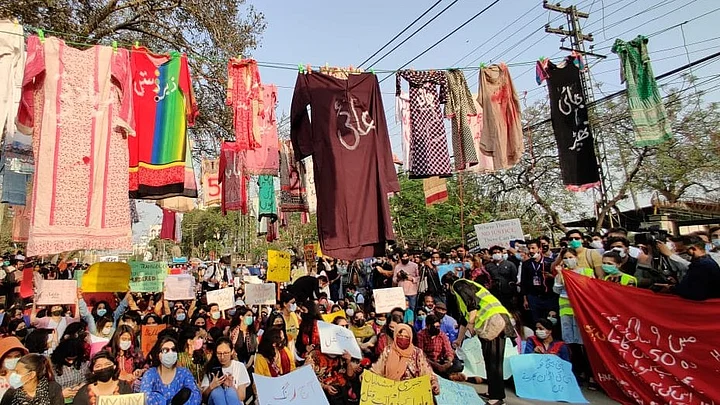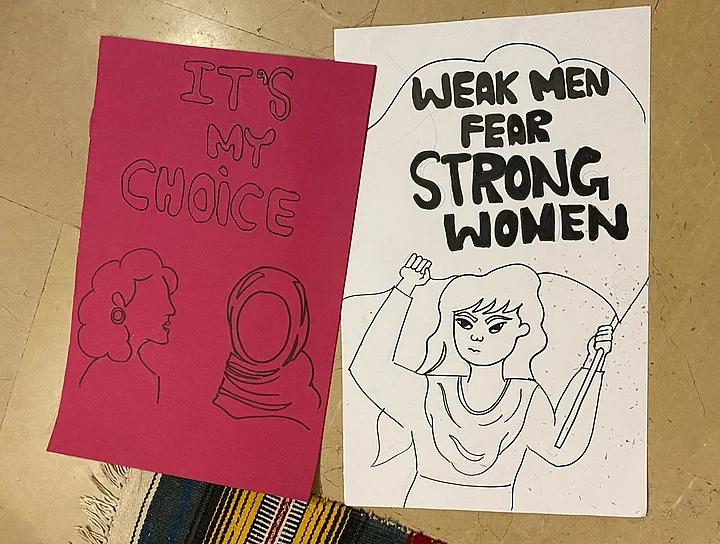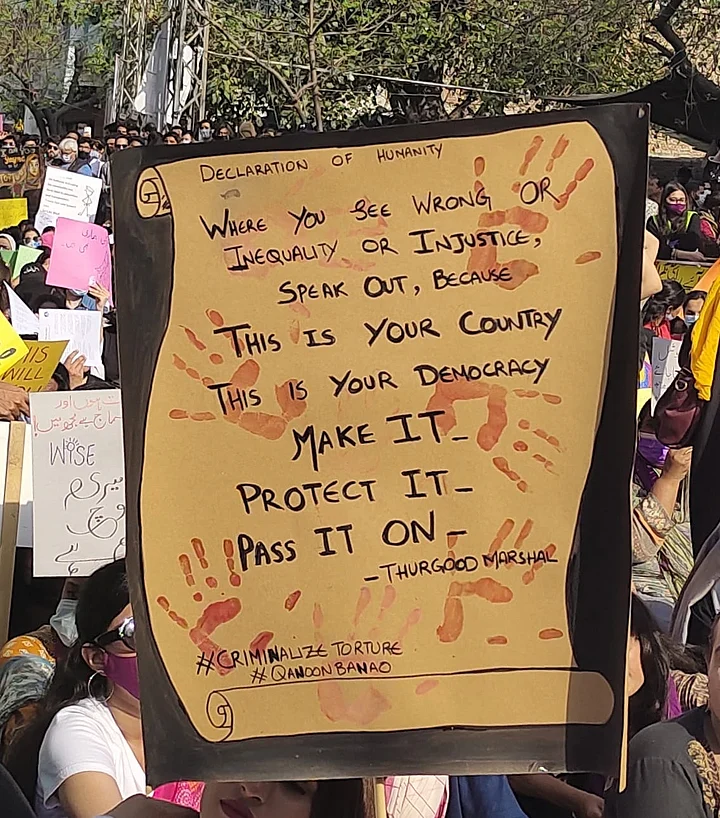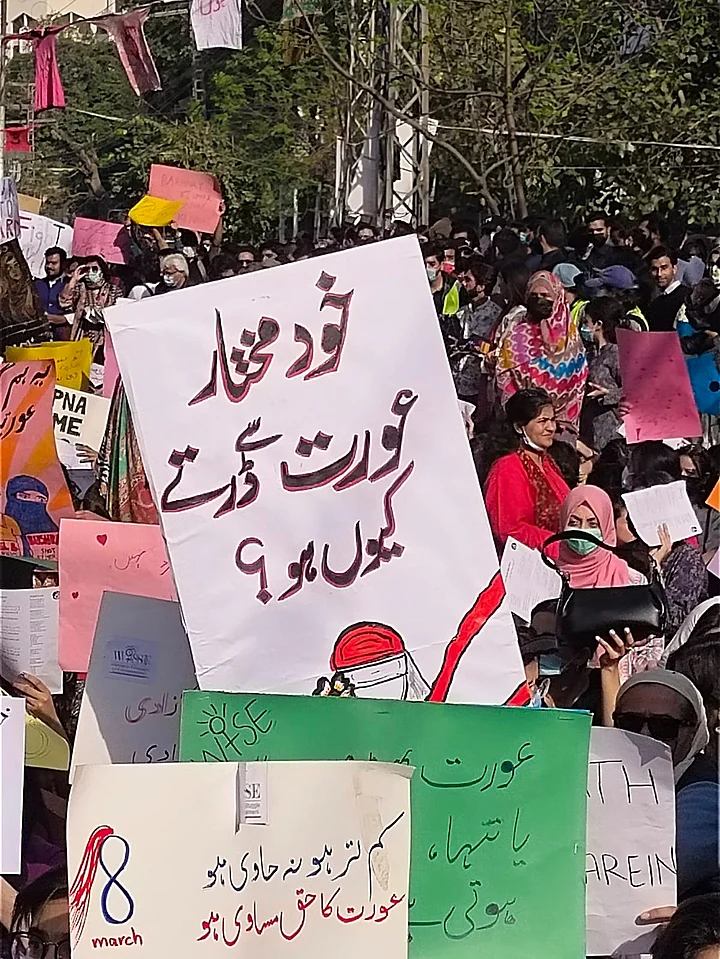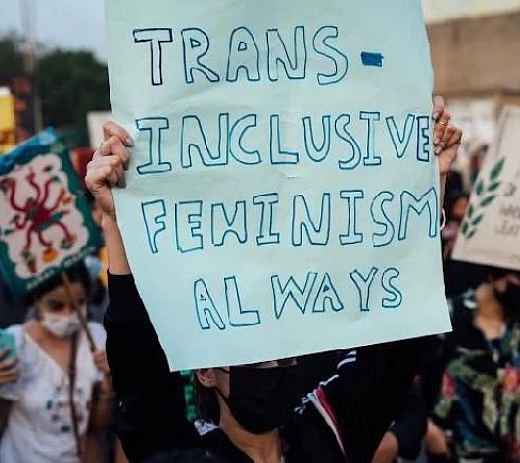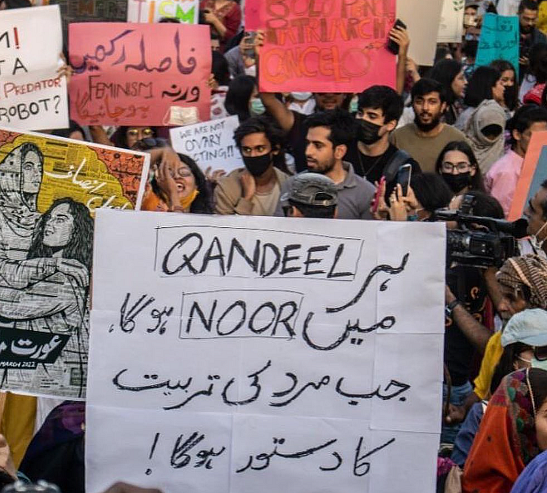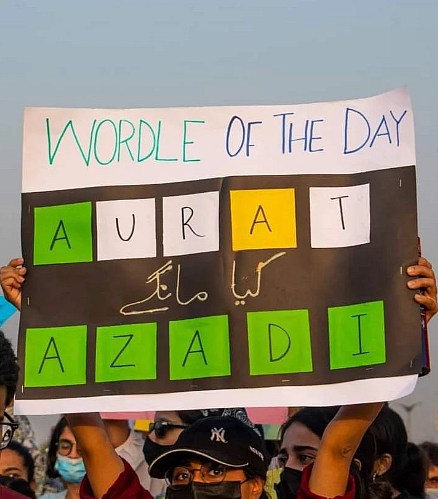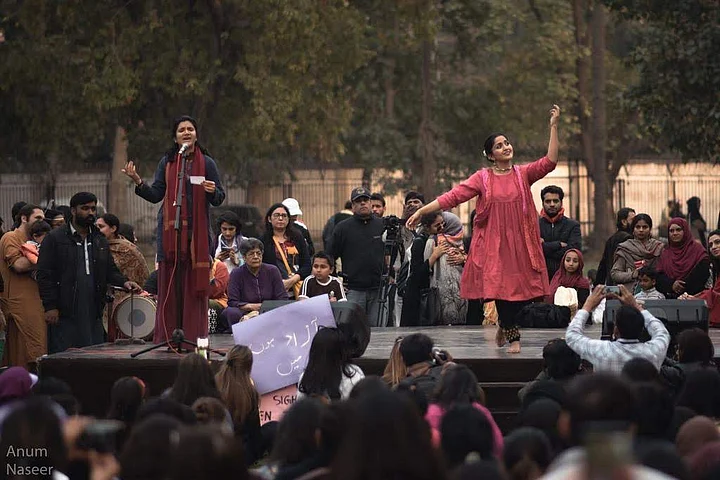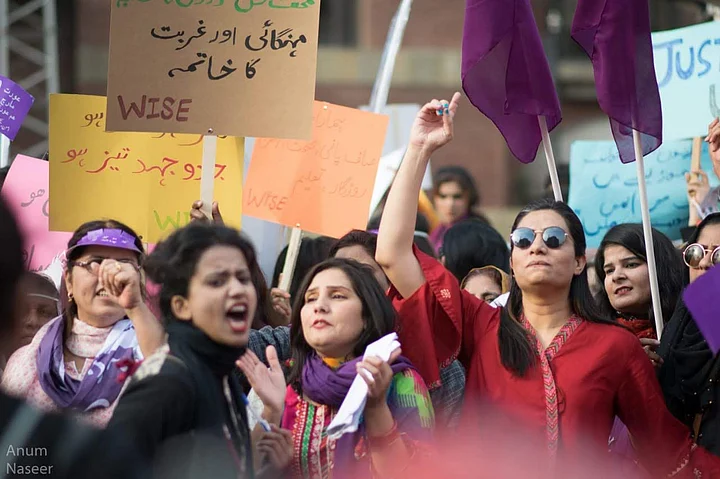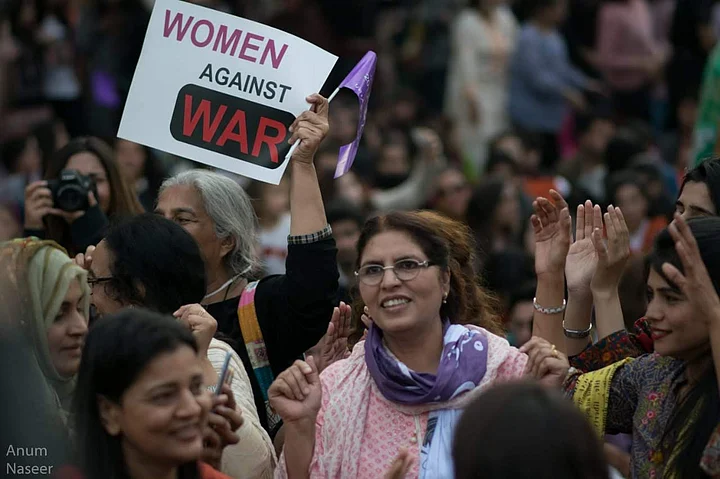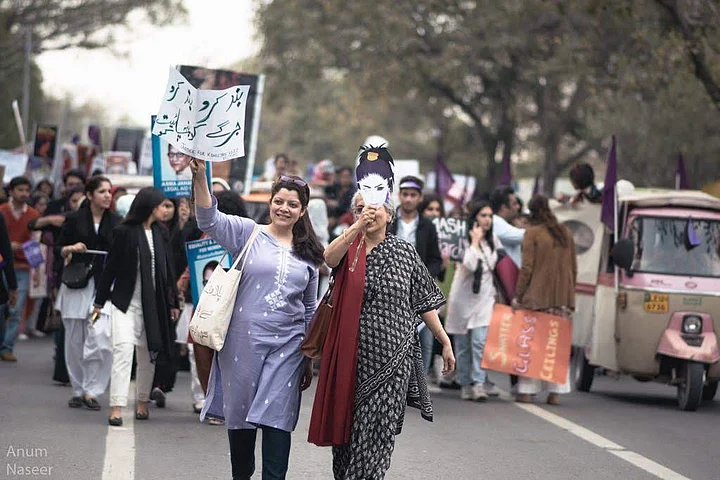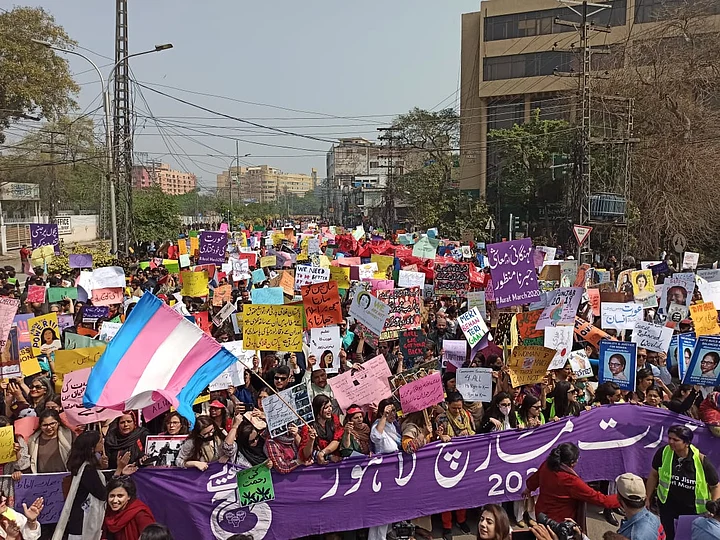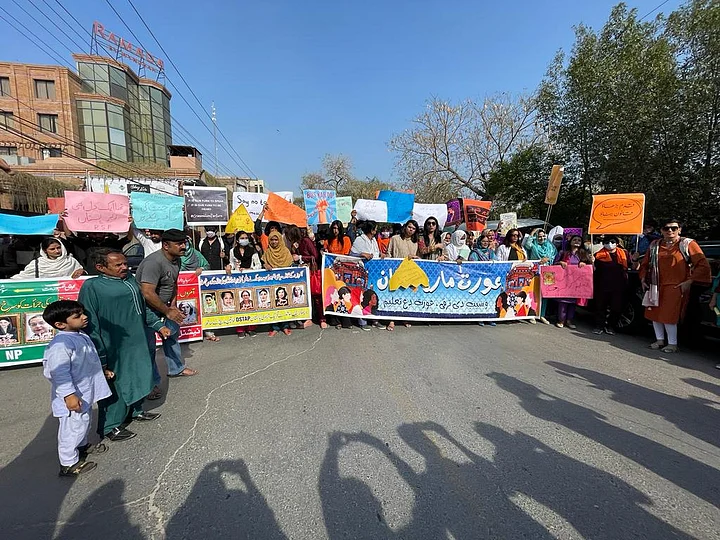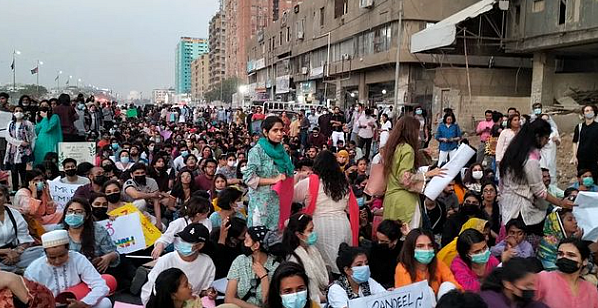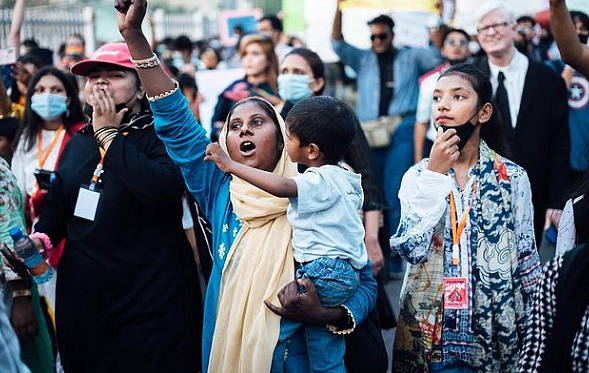"Regardless of whether we receive the NOC (No Objection Certificate), we will march on International Women's Day (8 March). It is our fundamental right," Fatima, a volunteer of the Aurat March in Pakistan's Lahore, told The Quint over the phone on Monday, 6 March.
The Deputy Commissioner (DC) of Lahore on Sunday, 5 March, refused permits for the Aurat March in the city, citing that it endorses "controversial slogans" and raises "security concerns." The Aurat March volunteers have approached the Lahore High Court, seeking a reversal of the ban.
The court is set to hear the matter on Tuesday, 7 March.
First taken out in 2018, the Aurat March has been organised in at least seven major cities in Pakistan over the last five years, including Karachi, Lahore, Islamabad, Hyderabad, and Multan.
The NOCs were initially denied in Karachi, Islamabad, and Multan as well, Laiba, another Aurat March volunteer, told The Quint. "We believe that this is the strategy of the current government to crush any feminist thought," she asserted.
On Tuesday, after negotiations with the district administration, Multan was granted a conditional NOC to hold the march.
- 01/06
Some of the slogans raised at Aurat March.
(Photo: Accessed by The Quint)

- 02/06

- 03/06

- 04/06

- 05/06

- 06/06

The annual march that coincides with International Women's Day not only addresses the oppression of women, trans people, and disabled people in Pakistan but also other systemic issues that plague the crises-struck nation.
The Quint spoke to the volunteers of the march about its significance, the revival of a feminist movement in Pakistan, and the religious and political backlash they are facing.
#MeToo Movement & Aurat March
"The Aurat March was not born in a vacuum. Violence against women in Pakistan is at an all-time high; discriminatory laws are still a part of our system. So, when the global #MeToo movement happened, we realised that we should revive the feminist movement led by our foremothers, who fought even during the martial law," Fatima told The Quint.
A collective called 'Hum Auratein' first organised the march in Karachi in 2018. Lahore followed suit in 2019, and subsequently, it spread to other cities. Each chapter of the Aurat March is, therefore, independent of one another.
The Aurat March is also led by young women. "The young women of the country are the most disenfranchised. They don't have the space to have their opinion and be a part of the political system. With the Aurat March, we decided that enough was enough," Fatima added.
Speaking to The Quint, Sabiha Shaheen, a youth development practitioner and a regular participant of the march, said: "Feminists in Pakistan have always been strategic in placing their demands forward. But the Aurat March was bold from the start. The young women are very straightforward and loud."
- 01/08
Stills from the Aurat March in Lahore and Multan.
(Photo: Accessed by The Quint)

- 02/08

- 03/08

- 04/08

- 05/08

- 06/08

- 07/08

- 08/08

Laiba, who is one of the five volunteers of the Aurat March in Multan, a city in South Punjab, told The Quint:
"Our demands may vary each year and also from other cities. This year, Multan is focusing on education and healthcare. We need more universities and hospitals. South Punjab was also badly hit by the floods last year. We want the government to ensure that the victims are given rehabilitation and resettlement."
Setting up sexual harassment committees in government institutions, recognising the economic oppression of women and gender minorities, and understanding how climate change disproportionately affects women are some of the other demands put forth by the Aurat March.
'Victims of Organised Hate'
But challenging oppression is not without consequences, said the volunteers. Over the last few years, they have been at the centre of an organised hate campaign – both online and offline.
"Since 2020, one of the biggest threats to Aurat March has been Jamaat-e-Islami, a religious political party in Pakistan. They have been running a hate campaign against us, claiming that we are trying to defame Islam and that we are funded by the west," said Laiba.
When Multan had its first Aurat March in 2020, Jamaat-e-Islami submitted an application to the Deputy Commissioner of Multan, saying that they would use force to stop the march if the administration fails to, alleged Laiba.
"After this letter went public, several women contacted me saying that their families were not permitting them to join the march."
Multan saw about a 100 participants that year. In 2022, the number was 500, but this year, it is set to go down because of the growing uncertainty, added Laiba.
"Even if only 50 people show up, I know that they believe that women, trans folks, disabled people, and children are equal human beings," she said.
Fatima said that Jamaat-e-Islami also launched a Haya March (Modesty March) last year in Lahore, which is a "counter-protest that aligns with Pakistan's religious morality." This year, too, the government has granted permission for the Haya March.
"A group of men who were part of this religious group came to the march last year and they were escorted by the police. No one batted an eye. They yelled at us and threatened us. They forced us to cut the march short."Fatima
Fatima added that the volunteers were also victims of a hate campaign on YouTube and other social media platforms.
"We have gotten threats from a lot of terrorist organisations as well. We were accused of blasphemy because someone tampered with one of our speeches. Even now, they photoshop our banners, write vulgar lines on them, and claim that we were holding this."
She alleged that many hostile YouTubers have invaded the marchers' privacy in the past – "by running after them, taking pictures of them, and targeting them."
The 'Mera Jism, Meri Marzi' Row
One of the most controversial aspects of the Aurat March has been one of its slogans – 'Mera Jism, Meri Marzi' (My Body, My Right).
"This slogan is one of the reasons why we are being denied permissions this year. Every year, we are asked not to recite this slogan," claimed Fatima.
'Mera Jism, Meri Marzi' was first used in 2020. Since then, it has been a subject of debate and controversy in religious and political circles. "Despite the threats, we have started owning the slogan. They thought they could shame us by giving the slogan a different interpretation, by calling us kharab auratein who propagate a 'western agenda'," said Fatima.
She added that when politicians or religious fundamentalists question them over the slogan, "we say that it is their mind that is dirty. When we say 'jism', they are reminded of a Bipasha Basu movie. But we are talking about our bodily agency, our agency to terminate a pregnancy. We are talking about the body that is getting raped and being subjected to domestic violence and harassment."
Laiba, however, said that as a consequence of this slogan, the "public perception of the Aurat March has been very hostile."
"When the government weaves a particular kind of narrative, obviously the public is going to get the same perception. When you are challenging a powerful structure in a patriarchal society, the powers are going to get offended," she added.
Even as the Aurat March is under the scrutiny of security authorities and religious groups, it has also been accused of being a movement led by "elite, upper class women," which does not address the reality of women's issues in Pakistan.
Laiba told The Quint, "I am privileged when it comes to a lot of things. It is a big privilege for a woman in this country to have higher education, to earn, to have the liberty to spend one's own money. A lot of women don't have this. If I have my privilege, then I should use it to fight for theirs."
